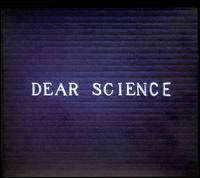
As the saying goes, third time’s a charm. Dear Science is a tremendous third effort by one of the most innovative and mesmerizing bands to emerge this decade. After the near universal acclaim for their second album, 2006’s Return to Cookie Mountain, it seemed hard to fathom that they would be able to outdo themselves once again. On their third album it seems like they’ve done just that. Their decision to shift into slightly more inviting sonic territory and their use of more instantly gratifying tunes has served them extremely well. They have not necessarily sacrificed their experimental nature for more accessible songcraft, but rather interlaced it more heavily with songs that for the first time in their career seem to come more from their hearts than their heads.
Brooklyn’s TV on the Radio are a product of a number of factors, some explainable and others not. Just listening to this album, there is undeniable influence stemming from such former legends as David Bowie and Prince. We are reminded of Bowie’s progressive, cutting edge sound from his classic LP Low on tracks like “Stork and Owl”, while on tracks like “Golden Age” and “Lover’s Day” there are moments of Prince’s sex-infused sound topped by towering falsettos. While these two artists certainly lent some colors to the band’s music palette, it is the band itself that has developed a sound that is both totally originally and incredibly powerful. Their post-expressionistic mentality has encouraged them to tap into a number of different of genres (post-rock, jazz, rap, classical, funk, electronic, ska) and somehow culminate them into an entirely fascinating and new sound.
On Dear Science, TVOTR is especially effective for their ability to manifest the spirit of the times in which we currently live in, accurately capturing a sense of uncertainty in one of the most uncertain times in American history. In opening track “Halfway Home”, the track begins with Adebimpe’s subdued and level-headed vocals pushing through persistent synths, attacking hand claps, and a persistent percussive beat. However, when he reaches the chorus his rise to a vulnerable falsetto feels like he’s regrettably giving in to the pressures that surround him.
The remainder of the album follows the pattern of the opening track, constantly switching back and forth between a sense of persistence to one of surrender. Whether its blaring horns (“Dancing Choose”), dark undertones of synths (“DLZ”), or abrasive rhthyms, there is always a sense of lingering danger in the world that TV on the Radio manifests. However, Tunde Adebimpe and Kyp Malone continue to boldly push through the darkness in hopes of reaching the light that we all know is at the end of the tunnel.
The combination of the last two tracks signifies this most effectively. “DLZ” is the second to last track, entrenching us in a world filled with fear and paranoia with thundering bass beats and cryptically lulling female vocals. Adebimpe’s vocals sound as if he is cautiously stepping through this terrifying atmosphere, only to crack under the pressure with his haunting and cathartic cry “This is beginning to feel like the dawn of the loser forever…”. Thus leading into the closer “Lover’s Day”, which becomes a curiously comforting signification of hope for the near future. While the subject matter is actually very sexual (another ode to Prince), the sound of the music is both enchanting and incredibly optimistic. After 10 tracks of uncertainty, “Lover’s Day” elevates us up to the top of the mountain, finally allowing us to see the joyous possibility that our future holds.
Moments like this are what make billions of people choose to turn to music as an accessible guide for understanding the incredibly complex world we live in. While thousands of news outlets may inform us on what's going on in the world (as exemplified by the character in “Dancing Choose”), music can often capture the world around us better than anything else. As the great Aldous Huxley once wrote, “after silence, that which comes closest to expressing the inexpressible is music.”
Key Tracks:
Halfway Home
Golden Age
Lover's Day
Final Verdict: 9.6
TV on the Radio - Golden Age



1 comment:
I've been hearing great things about TV on the Radio--definitely going to have to check this album out.
Post a Comment